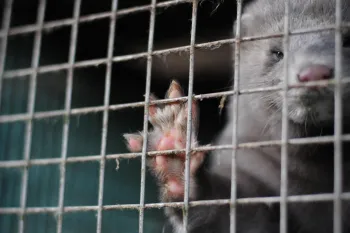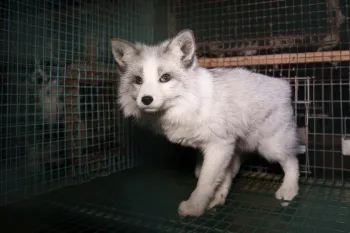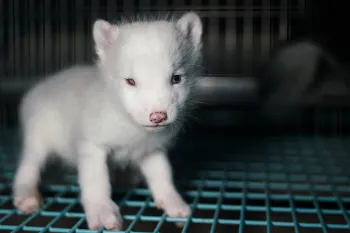When we talk about the end of the fur era, we point to a majority of well-known international brands and retailers that have gone fur-free and the dozens of countries, states and cities outlawing fur sales and fur factory farming. We point to our undercover investigations that show again and again the deeply felt suffering of animals on a stunningly immense scale. But we do not often hear from those who worked in the industry. For over a decade, Mike Moser was a senior director within the fur industry. He left when he would no longer defend the indefensible. Now Mike works as a consultant for Humane World for Animals UK, helping the campaign for a complete ban on the fur trade and advocating for a better, more compassionate world for animals.
“Poacher turned gamekeeper” is a common epithet I hear when I mention the dramatic change I made several years ago. Ironically inappropriate, maybe, but the sentiment is correct. And leaving the fur industry is one of the proudest decisions I have ever made.
For over 10 years I was a senior director in the fur industry. As director of standards for the International Fur Federation, I oversaw compliance with international and national welfare regulations and industry standards. I was also chief executive for the British Fur Trade.
I visited farms across the world and saw thousands of caged animals in supposedly high welfare countries, such as Finland and the U.S., as well as China. On one particular visit, I saw a fox, just one amongst thousands on the farm, curled up because the cage was too small for any meaningful movement. They raised their head and looked back at me with such abject misery, an animal clearly broken by the resignation of their fate.
Later, I was welcomed home by my beloved labrador Barney and couldn’t help but think about the fox. At that moment the hypocrisy of what I was doing really hit home. I was trying to defend the use of animals for fur when the empirical evidence clearly showed it was completely indefensible. And that it was never going to change.
The very next day I resigned.
Quite a bit of credit for my decision goes to Claire Bass, senior director of campaigns and public affairs at Humane World for Animals UK. Over the years Claire and I locked horns in debate many times: in front of government officials in Westminster and on live TV and radio. Before each debate I would study carefully Humane World’s position on fur and Claire’s key messages and rationale to better prepare my rebuttal. But over time I found that I agreed more with her messages than my own, which increasingly resembled vacuous sound bites. This played a huge part in my decision. (So, thank you, Claire!)
A little while later, Claire asked if I would support Humane World’s campaign to abolish the fur trade. I readily agreed—and haven’t looked back.
Policymakers responsible for animal welfare agree on the role of a science base in evidence-led policymaking. And though welfare science doesn’t measure humanity, I do agree with this. They also agree that regulations must be based on the best available evidence.
Unsurprisingly, fur farming operates under outdated regulations, wherever it takes place. In Europe, for example, they’ve remained unchanged for 26 years and so have farming methods. Animals are still kept in cages too small for any meaningful movement, engagement and other natural behaviors.
Though our understanding of sentiency and species-specific needs has evolved substantially, the fur industry has consistently shunned opportunities to improve animal welfare. Quite simply, in order to be profitable, fur farms have to use the high-density caging systems.
I saw animals, particularly foxes, rocking and pacing repeatedly, stereotypical behavior associated with mental disturbance. It is deeply upsetting. Compare this with the freedoms enjoyed by wild foxes and the depth of the cruelty of farming them for fur is clear.
And selective breeding has increased the size of mink and foxes, the latter reaching the proportions of medium-sized dogs. If we believe that keeping a dog in a small cage for his or her entire life to be wholly unacceptable to the point of criminality, then not to extend the same protection to foxes is inconsistent to the point of political and ethical hypocrisy.
The European Commission, which sets policy on fur farming, sought the advice of the European Food and Science Agency for an updated scientific opinion on the welfare of animals kept for fur production. In its extensive report published in July, the panel of 29 experts were unequivocal: the current caging system contributes to a long list of welfare problems that can only be substantially mitigated by replacing cages with enclosures large enough to allow natural behaviors. Put simply, the experts say: You cannot keep an animal in a small cage without causing suffering!
Though this is in itself very good news, we still have to wait until 2026 for the Commission to decide what this means for the fur farms that exist across Europe.
I strongly support a full ban on fur farming and the sale of all fur products. Anything less would be a betrayal of the millions of animals who suffer on fur farms—and go against the clear wishes of the 1.5 million European citizens who signed the FurFreeEurope petition calling for an end to fur farming and trade.
And let’s be clear, any option from the Commission that suggests “improvements” to allow fur farming to continue will just not work—for the animals or the farmers. That the fur industry would be able or willing to transition to larger cages, enclosures or provide other adaptations is fanciful—practically and financially. And besides, no animal should suffer to pamper the vanity of an ever-decreasing number of people who want to wear fur, however those animals are kept.
I will never forget the look on the face of that fox, in that cage, on that fur farm. It is a constant reminder that yesterday, today and tomorrow millions of animals just like them continue to be abused by the systemic cruelty of the fur industry.
Humane World for Animals has made a real impact. Together we must—and I strongly believe we will—end this terrible trade for good.
Mike Moser is a consultant for Humane World for Animals UK.



